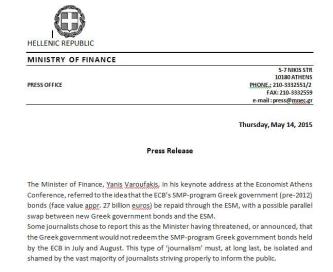Earlier today, Yanis Varoufakis, the Greek Finance Minister, gave the Keynote address to the “19th Economist Roundtable with the Government of Greece”. The topic of the two-day conference is: “Europe: The Comeback? Greece: How Resilient?”
While I could not find a video-taped version of the entire speech by the Minister of Finance, I landed on a video uploaded by Enikos.gr, which contains the better chunk of his speech. It seems that Varoufakis’s comments caused quite a stir earlier today, which led to an angry, official announcement by the Ministry of Finance. (See the end of this post)
As per usual, and given the fuzz created by his comments, I decided to transcribe the video of Varoufakis’s speech. Of course, it is incomplete (I begin at 3:05 of the video above, when V begins to talk about the really interesting stuff, and stop at the end of the video – and not at the end of Varoufakis’s speech). If I find the full video, I’ll make sure to provide a complete translation later on.
… They often ask me – and I reply in the following way – why we have not finished the negotiation yet: it is because – and I speak personally – as a Minister of Finance, I will refuse to put my signature in such a package [deal] that, from a macro-dynamic perspective, is not dynamically consistent. These numbers do not tie with each other. Because, if I place my signature [in such an agreement], I will be yet another Minister of Finance that signs a medium-term program of fiscal adjustment, which he knows cannot work. And it can be proven mathematically that it does not work!
Unfortunately, on the other side, there is an understanding of this. But at the same time, there are political limitations in accepting it. When they tell you in the corridors and with closed doors that “you are right! But how can I pass this from my parliament?” you understand that we have a problem of consistency of those things that need to be done in order to have the comeback [of Greece, or Europe], and those things that can pass from the parliaments. And here, I will agree with Mr. Letta, that it is an issue of governing Europe. We know it very well that Europe does not have the structure of governance that is required in order to solve such disputes.
But since I want to focus and give more time, as I said earlier, for the discussion – I also have to go to the parliament, and answer four relevant questions today at 11:00 – I will tell you very quickly what I think must be the basis of a solution. Of an agreement-solution, so that the comeback can happen.
The first [thing that is needed], I explained: a dynamically consistent fiscal framework, a medium-term program of fiscal adjustment that has coherence, logic, [and] consistency – domestic and through time.
The second – and let us be clear here – even with divine inspiration and intervention, with someone pressing a button and making our debt vanish, the problem of growth would not have been solved. It would have been helped, but not solved. You know that better than I do.
Why? Our government is determined not to have again primary deficits. But an economy that is on a ‘Great Depression’ – it is not the same as what we call ‘great depression’ in Greek – with such low economic activity, with labour markets that are weathered, and without banking trust, and [even] with primary surpluses from the government, the question is: where will the growth-momentum come from?
It is clear that state assets must be utilized. And here comes the question of what does it mean to utilize state assets. Obviously, I do not mean a fire-sale. I do not mean selling them off in minimum prices – money that you take and throw it in the bottomless barrel of a non-sustainable debt. For us, the utilization of state assets must contain a reasonable mix. On the one hand, of privatizations; in parallel, the state must maintain an equity stake, which will be used as an asset that – together with other assets, primarily of real estate – after the reform on proprietary rights over those assets occurs, they can be integrated in a new development bank that can use them as guarantees, and in coordination with the European Investment Bank (EIB), to leverage them with the goal of creating a flow of investments in the private sector.
And you know, this leveraging via such an investment package that will use the EIB could also be connected with Mr. Draghi’s Quantitative Easing (QE), given that it has already been decided by Mr. Draghi that the ECB will purchase in the secondary market bonds by the EIB.
With the stocks of this development bank to have been conveyed to the insurance funds, as compensatory benefits, as compensation, for the large decrease in their capitalization with the PSI in 2012. And whatever profits this development bank has – or at least, its dividends – could go to the insurance funds. With a parallel reduction – a drastic reduction – of the early retirements and a restructuring of the management of the insurance funds.
At the same time, the banking system must be uncooped from red loans. There is no country in the world where the banking system – and particularly, a banking system which has been re-capitalized by the little the Greek people had, through an enormous loan from our partners…
Nevertheless, the banking system has huge percentage of non-performing loans (NPLs). If we do not find a way to manage those, there is no chance that the banking system will perform the job that it has to do. This is why a company to manage those NPLs must be created – a bank stressed asset management agency, if you will – in coordination with the Hellenic Financial Stability Fund (HFSF). Why does this pillow of the HFSF exist? It exists in order to help the capitalization of the banks.
The capitalization of the banks – to which the Greek people contributed from what little it had – right now loses [and] withers because of the red loans. Obviously, we must do something about that. I have discussed it with my counterparts in France, Spain, Germany, and in Finland with NAMA; and it is clear that there are things that can happen, must happen, but they also need to be part of the negotiation.
In the beginning, I talked about the dynamically consistent fiscal framework that must not begin from 2020 and, moving backwards, decide today what the primary surplus is going to be now. But this means that if we do it properly, and have a coherent fiscal framework, in 2020 the debt is going to be much higher than what the target was. The reason is that it is not sustainable, ladies and gentlemen. Truth to be told, it is time for all of us to say publicly what we say in private. To put it simply, and with a euphemism: the Greek debt must be re-designed.
To give you an example. I am not talking about a haircut! ‘Haircut’ is a bad word, and we have forgotten about it. Even in 2012, we did not call it a ‘haircut’ but a ‘private sector involvement’ or ‘initiative’, something like that. In Europe we are great at producing euphemisms. A few more investments would be more useful [however].
Let me give you an example. In July or August, the Ministry of Finance is going to be called to borrow 6 to 7 more billion euros from our partners, in some way, in order to repay the bonds from the SMP program that was created by Mr. Trichet back in 2010-2011, which are withheld by the European Central Bank (ECB). The remaining amount of those bonds is 27 billion euros, which will have to be repaid in the next months and years, very soon. These bonds – and this is very simple – should be send to the distant future. This is crystal clear. And I think it is also crystal clear to the people of the ECB. Of course, the ECB right now has the great agony of how to continue with the QE against a Bundesbank that is quite negative and hostile. That’s why any discussion about haircutting these bonds of 27bn euros comprises, if you will, [is] a red …





